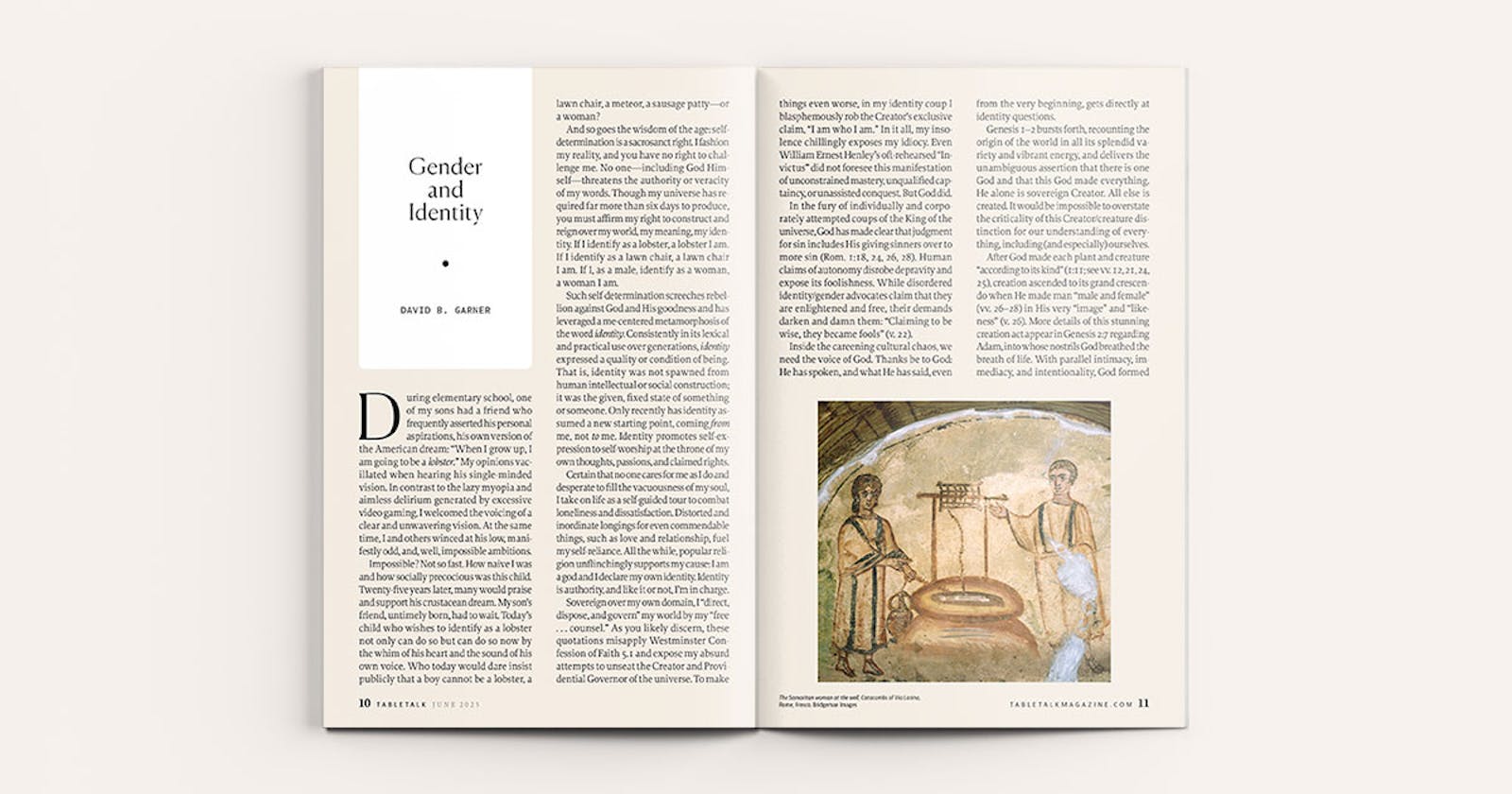Gender and Identity
During elementary school, one of my sons had a friend who frequently asserted his personal aspirations, his own version of the American dream: “When I grow up, I am going to be a lobster.” My opinions vacillated when hearing his single-minded vision. In contrast to the lazy myopia and aimless delirium generated by excessive video gaming, I welcomed the voicing of a clear and unwavering vision. At the same time, I and others winced at his low, manifestly odd, and, well, impossible ambitions.
Impossible? Not so fast. How naive I was and how socially precocious was this child. Twenty-five years later, many would praise and support his crustacean dream. My son’s friend, untimely born, had to wait. Today’s child who wishes to identify as a lobster not only can do so but can do so now by the whim of his heart and the sound of his own voice. Who today would dare insist publicly that a boy cannot be a lobster, a lawn chair, a meteor, a sausage patty—or a woman?
And so goes the wisdom of the age: self- determination is a sacrosanct right. I fashion my reality, and you have no right to challenge me. No one—including God Himself—threatens the authority or veracity of my words. Though my universe has required far more than six days to produce, you must affirm my right to construct and reign over my world, my meaning, my identity. If I identify as a lobster, a lobster I am. If I identify as a lawn chair, a lawn chair I am. If I, as a male, identify as a woman, a woman I am.
Such self-determination screeches rebellion against God and His goodness and has leveraged a me-centered metamorphosis of the word identity. Consistently in its lexical and practical use over generations, identity expressed a quality or condition of being. That is, identity was not spawned from human intellectual or social construction; it was the given, fixed state of something or someone. Only recently has identity assumed a new starting point, coming from me, not to me. Identity promotes self-expression to self-worship at the throne of my own thoughts, passions, and claimed rights.
Certain that no one cares for me as I do and desperate to fill the vacuousness of my soul, I take on life as a self-guided tour to combat loneliness and dissatisfaction. Distorted and inordinate longings for even commendable things, such as love and relationship, fuel my self-reliance. All the while, popular religion unflinchingly supports my cause: I am a god and I declare my own identity. Identity is authority, and like it or not, I’m in charge.
Sovereign over my own domain, I “direct, dispose, and govern” my world by my “free . . . counsel.” As you likely discern, these quotations misapply Westminster Confession of Faith 5.1 and expose my absurd attempts to unseat the Creator and Providential Governor of the universe. To make things even worse, in my identity coup I blasphemously rob the Creator’s exclusive claim, “I am who I am.” In it all, my insolence chillingly exposes my idiocy. Even William Ernest Henley’s oft-rehearsed “Invictus” did not foresee this manifestation of unconstrained mastery, unqualified captaincy, or unassisted conquest. But God did.
In the fury of individually and corporately attempted coups of the King of the universe, God has made clear that judgment for sin includes His giving sinners over to more sin (Rom. 1:18, 24, 26, 28). Human claims of autonomy disrobe depravity and expose its foolishness. While disordered identity/gender advocates claim that they are enlightened and free, their demands darken and damn them: “Claiming to be wise, they became fools” (v. 22).
What we are cannot be established by what fallen creatures invent in our minds or feel in our deepest passions.
Inside the careening cultural chaos, we need the voice of God. Thanks be to God: He has spoken, and what He has said, even from the very beginning, gets directly at identity questions.
Genesis 1–2 bursts forth, recounting the origin of the world in all its splendid variety and vibrant energy, and delivers the unambiguous assertion that there is one God and that this God made everything. He alone is sovereign Creator. All else is created. It would be impossible to overstate the criticality of this Creator/creature distinction for our understanding of everything, including (and especially) ourselves.
After God made each plant and creature “according to its kind” (1:11; see vv. 12, 21, 24, 25), creation ascended to its grand crescendo when He made man “male and female” (vv. 26–28) in His very “image” and “likeness” (v. 26). More details of this stunning creation act appear in Genesis 2:7 regarding Adam, into whose nostrils God breathed the breath of life. With parallel intimacy, immediacy, and intentionality, God formed out of Adam his perfect complement, Eve (vv. 21–22). In infinite wisdom, God made man male and female.
This binary, sexed creation advanced God’s purposes on earth and established the framework for understanding the relationship between Christ and His church. So beautiful was this crowning act of creation that Genesis 1:31 urges special attention: “Behold, it was very good.” Bursting with the excitement over the handiwork of God, the text solicits a response from the hearer: “Check this out!” So we must. And so we marvel.
The all-wise God made us as two sexes. He crafted each of us as male or female. By the one true God, we are “fearfully and wonderfully made” (Ps. 139:14), and by His astounding kindness, we are redeemed by and for Him (Rom. 11:33–36). We do not choose our hair color, foot size, or height. We do not choose our sex. And we must not choose a god of our making, because men can’t make true gods. The Creator stands blessedly alone as God.
Identity dwells in this divinely constructed and divinely prescribed framework. What we are cannot be established by what fallen creatures invent in our minds or feel in our deepest passions. As Moses put it and Jesus reiterated and ratified, true life and freedom come by feasting on every word uttered by the mouth of God (Deut. 8:3; Matt. 4:4). Thus, eagerly receiving God’s Word and pursuing His glory demarcate human purpose, and these acts secure deepest satisfaction because they align our thoughts with God’s. Creatures truly pinpoint their sweet spot when they delight in their Creator and His revealed design; accordingly, every word uttered by God’s mouth must govern all considerations of gender and identity.
In some cases today, the word gender is used synonymously with sex (male or female). More precisely, sex, which concerns one’s genetics and anatomy, is, by God’s design, binary. Gender is the application of sexed createdness, and refers to the functional outworking of our God-given maleness or femaleness. Gender, too, is binary. As Alfred Poirier of Westminster Theological Seminary recently pointed out, in both Old and New Testaments, Scripture operates with unbroken consistency: man and male are used interchangeably; woman and female interchangeably. The Bible presents precisely zero confusion between sex and gender and offers room neither for a glide across sex/gender categories nor for a gender smorgasbord.

Practically, then, in accordance with God’s design, our God-given sex must regulate all gender decisions. The Bible presents unambiguous instruction concerning men and women, our roles in the home and the church (Eph. 5:15–33), and the protection of the gender distinctions in the composite of relationships and roles in which God has placed us. It is also true that some gender-specific manifestations are culturally appropriated (e.g., blue for boys, pink for girls). Cultural appropriation is neither amoral nor to be simplistically addressed. Wisdom for making godly personal and cultural application of gender decisions (from daily matters, such as clothing and hairstyles, to vocational matters, such as military service) comes by filtering every decision through the grid of God’s Word and pursuing the God-appointed purposes of the two sexes in their webs of relationships: home, church, and society—personally, locally, regionally, and globally.
I offer three important, but necessarily selective, points.
Upholding the Creator/creature distinction. God made each of us. We don’t make ourselves. No denial, no redefinition, no insurrection actually changes us from creature to creator. Assertion to the contrary is both idolatrous and foolhardy. Our responsibility as creatures is to give glory and thanks, not to indulge in foolish pushback against our Creator. Only the One with absolute authority and autonomy rightly self-identifies as “I am who I am” (Ex. 3:14).
Upholding the divinely designed sex distinctions. God created us male or female. Sex and gender are God-given and fixed, not flexible; binary, not a potpourri of humanly contrived options. The fall of Adam and Eve corrupted humanity and ensured the universal effects of sin—including physical abnormalities. Cases of intersexuality (which includes a range of genetically induced abnormalities) exist, but distortions in genetics in a fallen world deliver no solid foundation for fluid gender claims. Note well that claims of high rates of incidence of intersex children require careful examination because of the conveniently imprecise and exceedingly broad definitions of intersexuality that inflate the actual numbers. Parents of children born with male and female sexual organs should be equipped to help their children pursue life decisions that submit to God’s “very good” binary, heterosexual design. Moreover, because of the divine word concerning sexuality, Christians must not cave to the pressure to employ someone’s chosen pronouns rather than to use the pronouns associated with the person’s God-given sex. Holiness before God and health in relationships necessitate upholding Scripture’s teaching on sex and gender.
Upholding the Christ/church distinction. God’s design of male and female informs the relationship between Christ and His church. Christ is not His church. And the church is not Christ. The church and Christ belong together by divine design, but neither becomes the other. Confusion or conflation of the two, in fact, proves idolatrous. Since maleness and femaleness in creation serve the Redeemer/redeemed distinction in God’s design for history, it ought not to surprise us that when gender distinctions are obliterated, Christ and His church get denigrated.
To be sure, identity and gender questions are deeply personal, but we must repudiate self-generated claims for identity and gender. God declared things into existence from nothing, and in His declaration come the identity, meaning, and purpose of all things (John 1:1–3; Col. 1:15–17)—including sex and gender. We are who we are because of Him and with reference to Him. Though fallen men and women sin in a myriad of ways, including the postulation of idolatrous gender ideologies and identity schemes, God in His abundant mercy redeems and restores. By the force of His Son’s resurrection, God releases those who are trapped in their I-am-god-and-I-declare-my-own-identity quagmire (see David B. Garner, “The Gospel and Identity in Christ,” wm.wts.edu/gospel-and-identity). He floods our souls with the transformative force of identity in the Redeemer, the Lord Jesus Christ, who identifies with His Father (John 10:30) and who is “not ashamed to call [us] brothers” (Heb. 2:11).
What a glorious identity we possess: made in God’s image, fallen in Adam, yet graciously and mightily renewed into the perfect image of His glorious Son (Rom. 8:29). “See what kind of love the Father has given to us, that we should be called children of God; and so we are” (1 John 3:1). Oh, yes. So we are.


Recent Comments